10 Apps That Use The Achievements Feature
 Jason Louro
Jason LouroThis post is part of a series on how gamification mechanics are used effectively in various types of consumer apps. You may find these gamification examples helpful if you are looking to incorporate gamification into your product strategy.
The Achievements Feature and Its Role in Gamification
In gamification, achievements are visual badges or acknowledgements earned upon completing specific tasks or reaching milestones. They provide a sense of accomplishment, track progress, and offer validation to users. Mobile and web apps use achievements in lots of different ways to motivate users, guide behavior towards desired actions, and increase engagement and retention. In this post, we're going to take a look at 10 platforms that use achievements to motivate users.
10 Apps That Use The Achievements Feature
Duolingo
Duolingo is a language-learning platform that uses gamification to motivate users to learn new languages through points, levels, and streaks.
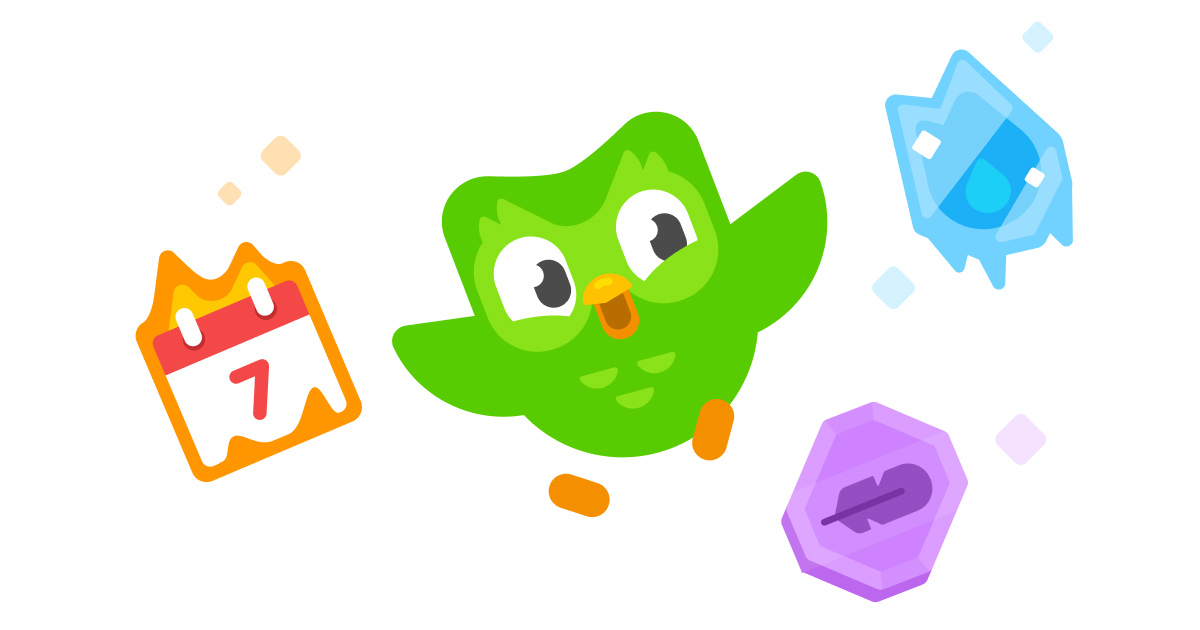
Duolingo uses achievements to keep users engaged and learning. These badges and goals, earned by completing lessons, reaching streaks, and topping leaderboards, offer a sense of progress and accomplishment. This gamification element motivates users to continue using the app daily by provide clear, short-term objectives beyond simply learning a language. They break down the learning process into manageable chunks, making the overall goal less daunting. The rewards, even if just a virtual badge, create a positive feedback loop that encourages consistent practice.
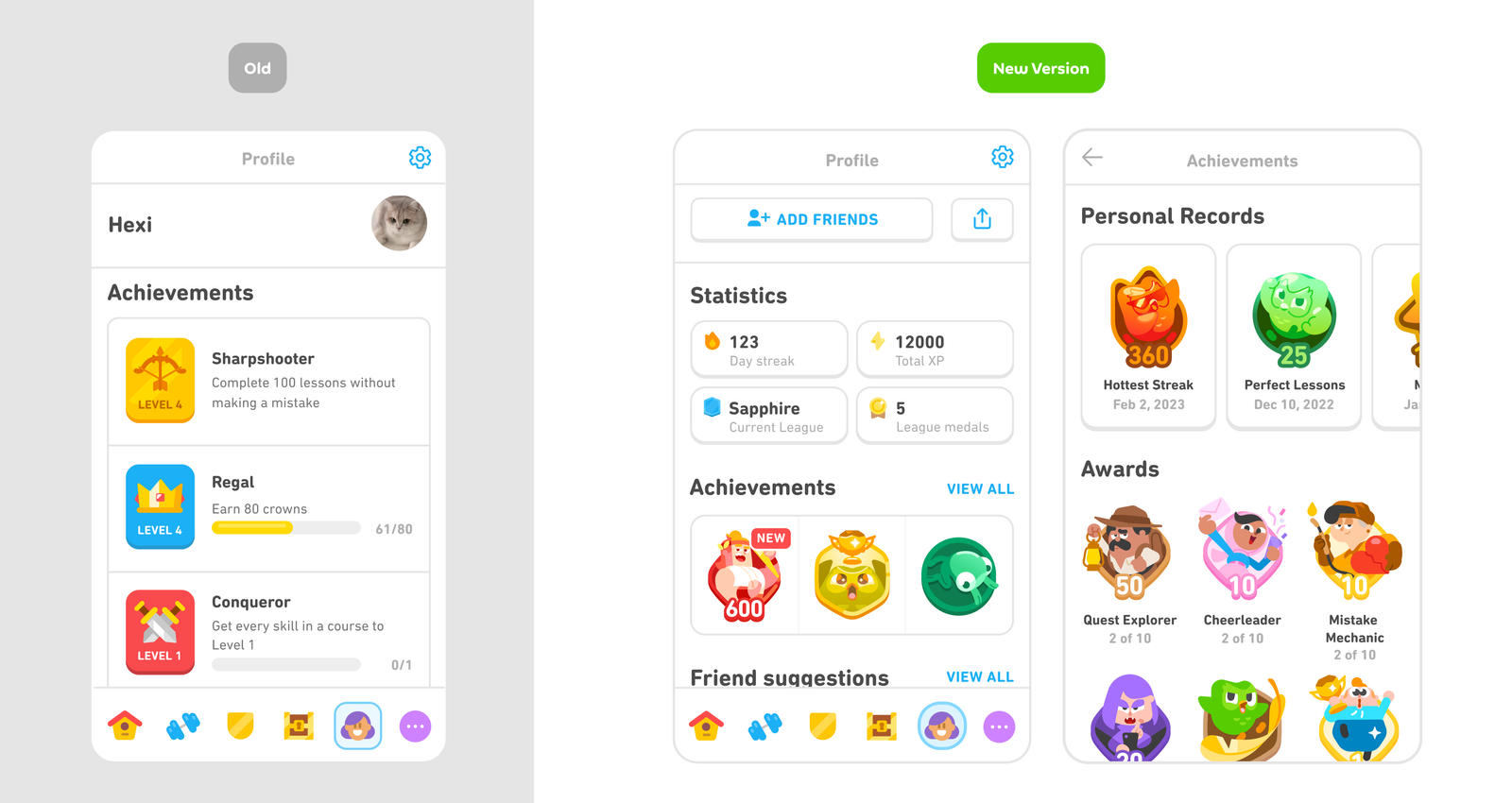
What's more, by having specific achievements tied to features across the Duolingo experience, users are encouraged to explore more of the app. Some achievements promote completing lessons and reaching streak milestones, others promote competition through topping leaderboards, fostering a sense of community. This exploration enhances the user experience and maximizes the value users can achieve from Duolingo.
Coursera
Coursera provides online courses, certificates, and degrees from top universities and institutions.

Coursera app utilizes achievements in ther form of certifications to boost user engagement and retention by encouraging users to complete courses, earning high grades, participating in discussions, and mastering specific skills. These certifications act as visual markers of progress, providing users with a sense of accomplishment and motivating them to continue learning. These digital rewards align incentives between users and Coursera and contribute to a feeling of validation and encourage users to invest further time and effort into their learning journey. The gamified aspect, with visible progress and recognition, keeps users hooked and encourages them to explore new courses and skills to unlock more achievements.

And beyond the platform itself, certifications can be showcased on professional profiles like LinkedIn, demonstrating acquired skills and knowledge to potential employers whilst also providing Coursera with an excellent source of organic user-generated content to aid in creating new inbound leads.
Strava
Strava is a social network for casual and professional athletes to track activities and allows users to share progress, join challenges, and compete on leaderboards.

Strava strategically uses achievements to boost user engagement and retention by awarding badges and trophies for completing Segments, achieving personal bests, and reaching goals. These achievements provide immediate positive feedback and create a sense of accomplishment, encouraging users to continue using the app.
The competitive aspect of Segment leaderboards and challenges further drives engagement whilst connecting users and fostering network effects. Users strive to earn coveted King/Queen of the Mountain (KOM/QOM) titles and complete monthly or weekly challenges to earn digital badges, providing a real incentive for users to come back and use the app each week, to either keep a hold of their title, or try again to reach the top.

Beyond pure gamification, achievements add value by providing data-driven insights into personal progress. Users can track their personal improvements over time, identify areas for improvement, and set new goals. This personalized feedback loop motivates consistent use and reinforces the app's value as a tool for fitness tracking and improvement.
Forest
Forest is a productivity app that helps users stay focused by planting virtual trees that grow while they avoid using their phones.

The Forest app uses achievements to motivate users and help them stay focused on their work. These achievements encourage consistent focus on work, revision, or any other task by rearding users with a large virtual forest if they are able to stick to it.
By completing these challenges, users unlock new tree species and plant themes, adding visual variety to their forest and a sense of personalization. The achievement system encourages users to keep planting trees regularly and the rewards associated with achieving milestones provide a tangible sense of progress and accomplishment, reinforcing positive work habits. This results in users being far more likely to return to the app to earn more achievements and expand their virtual forest, boosting retention.

Ultimately, the achievements feature in Forest provides value by transforming focus and productivity into a game. This gamification makes the act of concentrating less tedious and more rewarding, encouraging users to stick with their goals and build a valuable habit.
Walkr
Walkr turns walking into an interstellar adventure where your steps power a spaceship exploring the galaxy.

Walkr leverages achievements as a core mechanic to boost user engagement and retention whilst promoting excercise. By completing specific in-game tasks, like exploring a certain number of planets or collecting a particular resource, players unlock achievements. These achievements are not merely cosmetic badges; they often reward players with valuable resources like energy, cubes, or even special boosts that accelerate their progress within the game.
This system actively encourages players to explore different facets of the game and experiment with strategies, naturally helping them to do more excercise. Chasing specific achievements provides clear goals and objectives beyond the main storyline, giving players a sense of direction and accomplishment.

Overall, achievements add value by gamifying the user experience, transforing excercise into an engaging quest, providing tangible rewards for continued effort, and contributing to a sense of accomplishment.
Productive
Productive is a habit tracker that helps you build a routine with positive, life-changing habits. Set personal goals, track your progress, and motivate yourself.
Productive uses achievements to boost user engagement and keeps users coming back. Achievements in Productive are earned for completing tasks, maintaining streaks, and reaching personal goals within the app, acting as visual reminders of progress and providing a sense of accomplishment.
By gamifying habit tracking, achievements encourage users to stick to their routines as seeing earning badges makes the process more rewarding than simply marking a task as complete and moving on.
This positive reinforcement keeps users invested in the app and their personal growth, ultimately adding value by making habit formation more tangible and engaging. This sense of progress strengthens the user's connection to the app and its tools, increasing the likelihood of long-term habit adoption and continued use.
Sleep Cycle
Sleep Cycle tracks your sleep patterns and wakes you up during your lightest sleep phase. The app presents sleep data in an easy-to-understand format.
Sleep Cycle allows users to set their sleep goals and tracks sleep quality to boost user engagement and retention. Sleep Cycle motivates users to track their sleep regularly which over time results in better sleep patterns for users. This is another great example of an app perfectly aligning gamification with the core value the app provides, which is key for implementing a successful strategy.

Completing challenges like logging a certain number of sleep cycles, maintaining consistent sleep schedules, or reaching specific sleep quality scores provides users with a sense of accomplishment and reinforces positive behaviors. The visible progress serves as a reminder of their commitment to improving their sleep and strengthens their connection to the app.
Ultimately, Sleep Cycle's achievements feature transforms a basic sleep tracking app into a more engaging and rewarding experience, incentivizing consistent usage, reinforcing positive behaviors, and providing users with a sense of accomplishment, which all contribute to increased retention and engagement.
Personal Capital
Personal Capital provides financial planning tools with a focus on investments. It engages users by showing investment performance and progress toward financial goals.

The Personal Capital app uses achievements as a core feature to boost user engagement and retention. These achievements gamify financial management by rewarding users for positive behaviors like linking accounts, setting financial goals, and consistently tracking spending. Earning badges and points for these actions provides a sense of accomplishment and motivates users to interact with the app more frequently.
These achievements go beyond simple badges. They often point users towards unexplored features or areas of the app that could be beneficial to their financial well-being. For example, an achievement for "Retirement Planning" might encourage a user to explore the retirement planning tools, thereby increasing their understanding of their financial situation and the value Personal Capital offers.

Ultimately, the achievement system increases user engagement with an app that would otherwise perhaps be used once or twice a year by providing consistent positive feedback and encouraging exploration of the app's functionalities. This combination leads to a more engaged user base who are not only actively managing their finances but also developing a stronger connection with the Personal Capital brand, increasing its perceived value.
SuperBetter
SuperBetter increases your resilience, strengthens relationships, finds meaning, and achieves ambitious goals. Unlock your heroic potential and overcome real-life challenges.
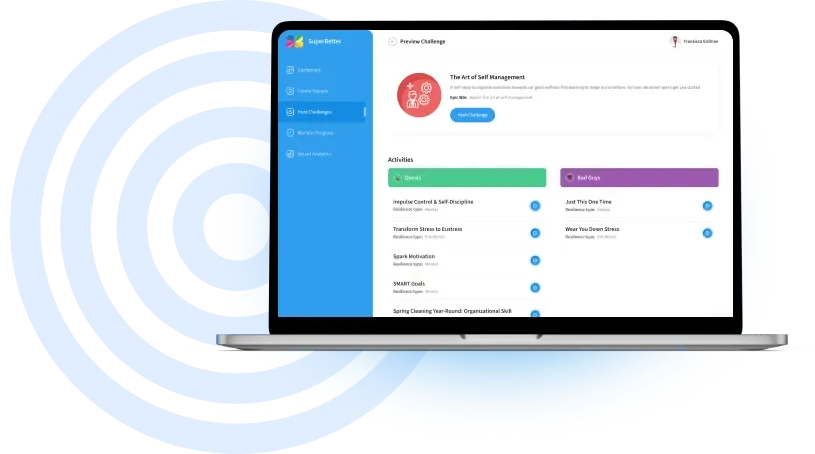
SuperBetter utilizes achievements as a core mechanic to boost user engagement and retention. These achievements reward players for consistent use of the app and for completing activities that contribute to their real-life mental health goals. Simple actions like logging in daily, completing Power-Ups, or defeating Bads (bad habits) can trigger these rewards, providing immediate positive reinforcement and a sense of progress.
The app strategically designs achievements to encourage users to explore different aspects of the SuperBetter system. Some achievements guide players to try new Power-Ups or Quests, exposing them to more features and broadening their understanding of how to use the app effectively. This guided exploration prevents users understanding of the platform from becoming stale and encourages them to continuously work towards better mental health.

Ultimately, achievements in SuperBetter add value by providing a sense of accomplishment and tangible progress toward personal growth. They transform abstract goals into a series of smaller, achievable steps, making the journey less daunting and more rewarding. This constant positive feedback loop motivates users to stick with the app, build resilience, and ultimately achieve their desired outcomes.
Note Rush
Note Rush is a game to help you learn to read sheet music.
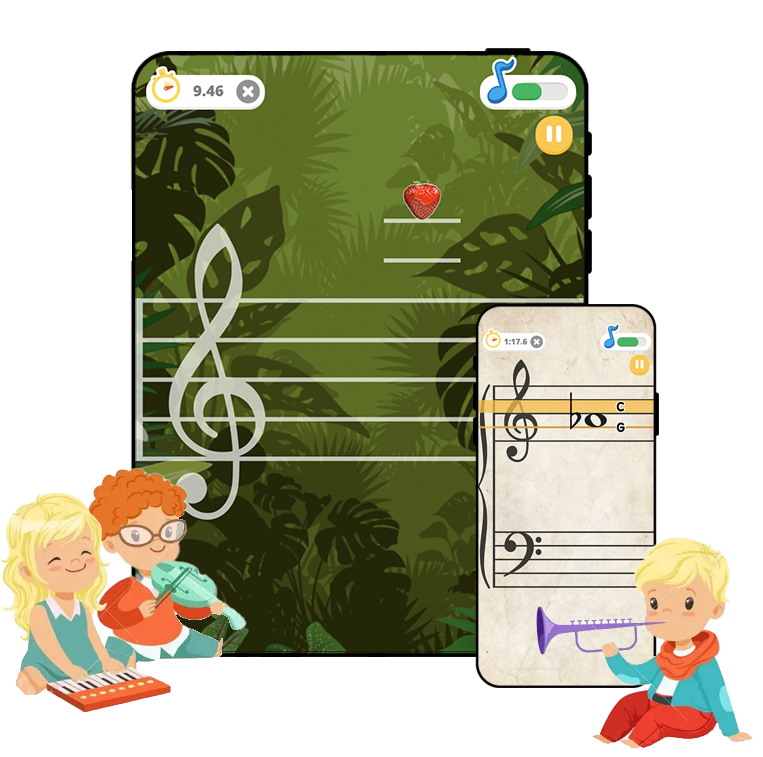
Note Rush uses achievements to keep players engaged and coming back for more. These achievements act as mini-goals within the game, rewarding players for consistent practice, accuracy, and reaching milestones. For example, achievements might be awarded for playing a certain number of notes correctly in a row, completing a specific song, or practicing for a set amount of time each day.
By providing these tangible rewards, achievements give musicians a sense of accomplishment and progress motivating them to continue playing and improving their music-reading skills. Seeing their progress tracked visually through completed achievements keeps them invested and encourages them to set new goals.
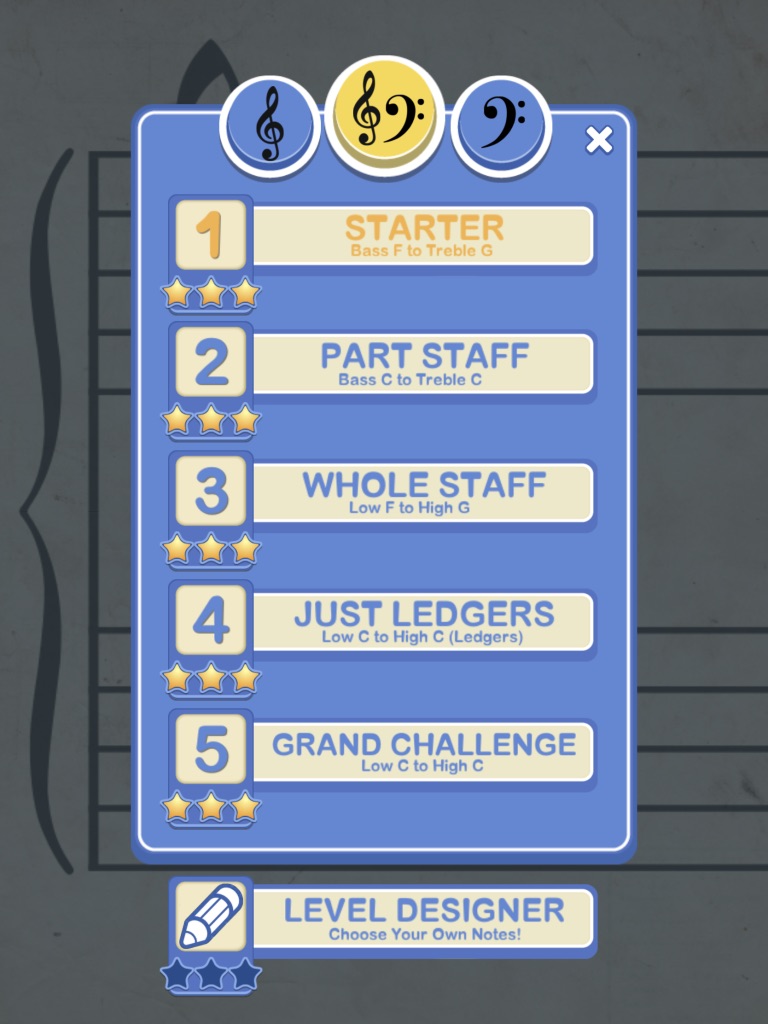
Overall, the achievements feature in Note Rush adds value by gamifying the learning process. It turns practice into a fun and rewarding experience, making it more likely that users will stick with the app and develop their musical abilities.
Conclusion
These are just a few examples of how achievements can be used as a gamification mechanic to improve consumer apps and platforms. We hope you can see that there a number of uses cases for achievements, perhaps in platforms that you might not necessarily expect. Most platforms could benefit from the retention boost that gamification offers, so we hope that these examples help you think about how you can incorporate gamification into your own product strategy.
If you're looking to build gamification into your app or platform, we encourage you to check out Trophy, a set of APIs and tools that make it easy.
Trophy is gamification infrastructure that retains users.
Gamification infrastructure that retains users.
Gamification APIs for web and mobile
Free up to 100 users. No CC required.
Try Trophy for free.